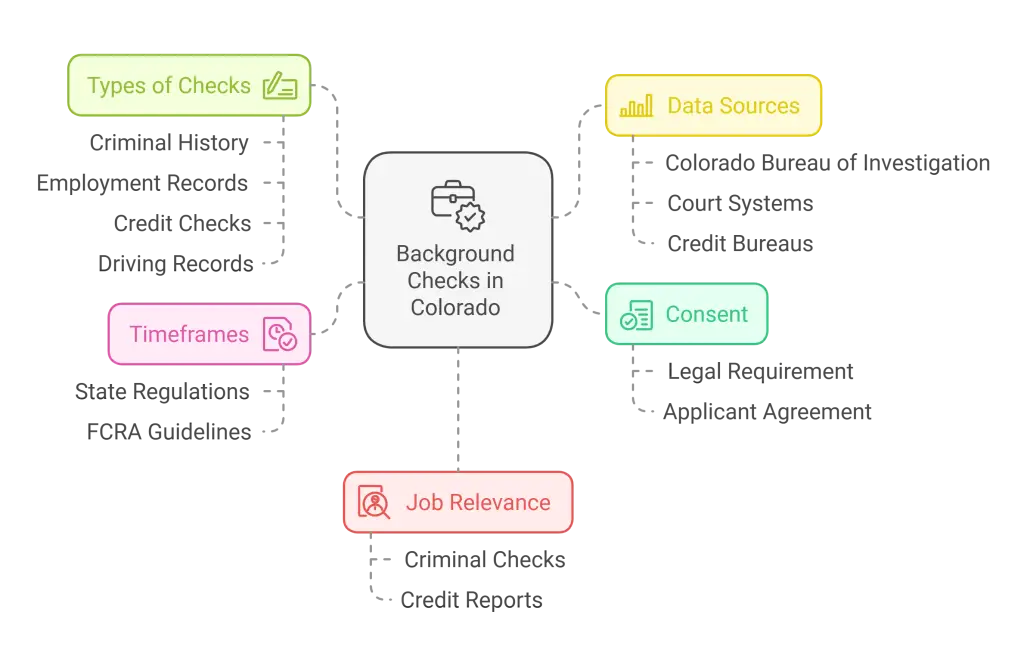Navigating the intricate landscape of Colorado background checks is essential for businesses aiming to hire responsibly while complying with state and federal regulations. Missteps in this area can lead to severe legal consequences. This guide provides a thorough overview of the processes, laws, and industry-specific considerations necessary to conduct effective background checks in Colorado.
Key Takeaways
- Background checks are essential for informed hiring decisions in Colorado, requiring businesses to navigate complex federal and state regulations to avoid significant legal and financial risks.
- Conducting background checks in Colorado requires obtaining applicant consent and varies based on job requirements, shifting from criminal history to credit checks while considering privacy regulations.
- Compliance with Colorado's legal framework for background checks, including the Colorado Chance to Compete Act, Ban-the-Box laws, and the Fair Credit Reporting Act, is critical to avoid penalties and litigation.
- Different industries like healthcare, education, and financial services require specialized background checks to meet legal standards and ensure safety and trust within their workforce.
- The future of background checks in Colorado may involve AI and blockchain technologies, necessitating businesses to balance privacy concerns with efficient hiring practices and stay abreast of potential legislative changes.
Introduction
When it comes to hiring in Colorado, background checks are not just a good-to-have but a crucial component of informed and responsible employment decisions. Businesses leverage these checks to manage risks and secure their workforce integrity, ensuring that new hires align with both ethical standards and operational needs. A misjudgment in this area can expose a company to significant risks, including financial liabilities and reputational damage.
However, navigating the terrain of background checks isn't straightforward. The legal framework surrounding these checks is a maze of federal and state-level regulations. Colorado stands out with its stringent guidelines, demanding adherence to multiple laws that govern the handling of personal data. Understanding these complexities is non-negotiable—any oversight in compliance can lead to legal complications, ranging from fines to lawsuits. In this guide, we distill the essential elements businesses must grasp to conduct and evaluate background checks effectively, ensuring both compliance and prudence in their hiring practices.
EXPERT INSIGHT: Operating a business or representing one as an HR professional or leader can be daunting. In Colorado, state-specific laws and offices ensure fairness in the hiring process and equal opportunities for candidates. Within the realm of background checks, numerous government departments and private agencies can assist in navigating these complexities. Resources such as the Colorado Division of Labor Standards and Statistics and the Colorado Civil Rights Division provide guidance on compliance and best practices. Leveraging these resources can help you maintain a fair and legally sound hiring process, ultimately benefiting both your organization and prospective employees. - Emile Garcia, SHRM-SCP, CHRP, CHRBP
How Colorado Background Checks Work
When it comes to conducting background checks in Colorado, there are some simple steps businesses should follow to keep things smooth and legit. First up, get the applicant's consent. That's not just a courtesy—it's a legal requirement. Once you have that, it's time to start digging into the details, but within clear limits.

Background checks aren't one-size-fits-all; they vary depending on the role's requirements. You might explore criminal history, check out past employment records, and occasionally dive into credit checks. Interested in driving records? They can be essential for delivery drivers and similar roles.
For most of this info, you'll tap into various sources. The Colorado Bureau of Investigation (CBI) is a go-to for criminal background checks, while broader record searches might lead you into court systems or specialized databases. Need some credit info? Yep, credit bureaus are your ally here.
Let's not forget about timeframes—the info you pull up doesn’t cover a person's entire life. Essentially, how far back you can check varies and often involves balancing state regulations with the Fair Credit Reporting Act guidelines.
Lastly, focus on the specific type of checks relevant to the job. Criminal checks are standard, but credit reports aren't always necessary unless the job demands fiscal responsibility. By knowing what data to hunt down and being mindful of privacy regulations, you keep the checks efficient and respectful.
Colorado Background Check Laws and Regulations
Understanding Colorado's legal framework for background checks is critical for maintaining compliance and avoiding costly penalties. Here's what businesses need to know about key legislation affecting background checks in the state:
Colorado Chance to Compete Act
Aimed at fair hiring, this act restricts employers from asking about criminal histories on initial job applications—a practice often referred to as "Ban-the-Box." Employers can inquire about criminal records later in the hiring process, ensuring that applicants are evaluated on their qualifications first.
Ban-the-Box Laws
These laws differ between public and private sectors. For public employers, restrictions are tighter, often barring any criminal history questions until an interview or a conditional job offer. Private employers have more leeway but are still bound by timing regulations.

Equal Pay for Equal Work Act
While primarily about pay equity, this law underscores the necessity for unbiased background checks. Any inferred discrimination from background findings could intersect with pay disparities, making it essential to ensure checks are fair and consistent.
Colorado Employment Opportunity Act
This anti-discrimination law covers all employment practices, including background checks. Employers must ensure their processes do not inadvertently result in unequal treatment based on race, gender, or other protected characteristics.
Clean Slate Act
This legislation permits certain criminal records to be sealed, making them inaccessible during background checks. Familiarize yourself with what records might be unavailable to ensure comprehensive compliance.
In Colorado, expungement and record sealing are two distinct processes. Expungement completely erases records from public view, making them inaccessible during background checks. Record sealing, on the other hand, restricts access to the records but does not completely erase them.
It's important to familiarize yourself with these distinctions to ensure comprehensive compliance with background check requirements.
Colorado Consumer Protection Act (CCPA)
The CCPA focuses on data privacy, obligating employers to handle personal information responsibly. Unauthorized or careless handling of background check data could lead to legal repercussions under this act.
Federal Fair Credit Reporting Act (FCRA) Compliance
The FCRA sets precise guidelines for using consumer reports, including the necessity of obtaining written consent from job applicants. It also mandates clear disclosure if an adverse decision is based on report findings, offering the candidate a chance to dispute inaccuracies.
Failing to comply with these laws can result in stiff penalties, including fines and potential litigation. Staying abreast of legislative changes and seeking regular legal advice are prudent steps for any employer navigating Colorado's background check requirements.
Special Considerations for Different Industries
When conducting background checks, one size doesn't fit all. Industries have specific requirements and nuances that businesses must account for to ensure compliance and make informed hiring decisions. Let's break it down:
Healthcare
Healthcare employers must adhere to stringent regulations. Background checks often include verification of licenses, credentials, and comprehensive criminal history screenings. Given the sensitive nature of patient care, these checks are crucial. They ensure that nurses, physicians, and other licensed professionals meet legal requirements and meet the ethical standards necessary for patient safety.
Education
Schools and educational institutions prioritize child safety, which demands thorough background screens for teachers and staff. This includes fingerprint checks and child abuse clearances. Colorado mandates these checks to prevent individuals with histories of abuse or misconduct near vulnerable populations. It's a protective barrier ensuring a safe educational environment.
Financial Services
Within the financial sector, handling sensitive information and capital necessitates more than just a clean criminal record. Credit checks are standard for roles involving financial advising or money management, ensuring potential employees have sound financial histories themselves. Compliance with both state and federal financial regulations is non-negotiable here.
Transportation and Logistics
This industry is heavily regulated, particularly when it comes to positions involving driving. Background checks include a review of driving records, criminal history, and often drug and alcohol testing in line with Department of Transportation (DOT) guidelines. The focus is on maintaining safety standards not only for employees but also for the public.
Government and Public Sector Jobs
Government roles often require even more rigorous background evaluations, including security clearances that check federal databases. The processes are designed to uphold trust and integrity in public service by ensuring that employees have no compromising issues that could affect their duties. This includes potential biases and allegiance assessments critical to national security.
Different industries demand specialized background checks balancing compliance with their unique operational risks. Understanding these distinctions ensures businesses not only meet legal requirements but also maintain a safe and effective workforce.
Adverse Action and Dispute Resolution
When an employer considers using a background check to make adverse decisions, like rescinding a job offer or terminating employment, there's a specific protocol to follow, thanks to FCRA requirements. It's vital to approach this process meticulously to avoid legal repercussions.

Adverse Action Process
Start with a pre-adverse action notice, which notifies the applicant or employee about the potential decision and includes a copy of the background report. This step ensures transparency and allows the individual to review the information that might affect their employment status. The notice must also include a summary of rights under the FCRA.
After delivering the pre-adverse action notice, give the individual a reasonable amount of time to address any potential inaccuracies or provide context. Generally, a timeframe of around five business days is considered adequate, though this can vary depending on your specific company policy.
If, after considering any additional input, you decide to proceed with the adverse action, issue a final adverse action notice. This document must include contact details of the consumer reporting agency used, a statement that the agency did not make the decision, and a reminder of the individual’s right to dispute the report’s accuracy.
Addressing Errors in Reports
Mistakes happen, even in background checks. Employers should be prepared to guide individuals through the process of disputing inaccuracies. This involves contacting the consumer reporting agency to raise the issue. The agency then has 30 days to investigate and resolve the dispute. Ensuring that the employee or candidate knows this process helps rectify mistakes and builds trust and transparency in your hiring or employment practices.
Self-Check and Record Management for Businesses
Encouraging employees to self-checks can streamline hiring processes and reduce surprises in background results. While many applicants may not regularly think of checking their records, proactive self-checking allows them to catch and address any discrepancies or inaccuracies before the hiring stage. This initiative not only gives them confidence but also saves businesses unnecessary headaches.
For businesses, effective record management is critical. Keeping thorough and orderly background check records ensures compliance with regulations and facilitates seamless retrieval when needed. It's advisable to utilize digital tools that enable secure storage, yet allow for quick access when necessary. Businesses should maintain a record retention policy aligned with both state and federal guidelines, ensuring that records are not kept longer than necessary while still complying with legal requirements.
Employers can benefit from resources such as the Colorado Bureau of Investigation (CBI) website for guidelines and legal templates. Sample consent forms and recommendations for conducting compliant background checks can also be found online, providing a robust foundation for businesses to build their background check protocols. By leveraging these resources and encouraging a culture of transparency, businesses can significantly streamline their processes and enhance compliance.
Colorado Background Check Resources
Here is a table of related government websites that would be useful for Colorado business owners interested in background checks:
| Website Name | URL | Description |
|---|---|---|
| Department of Labor and Employment (Colorado) | https://cdle.colorado.gov | Offers resources on labor laws, employment regulations, and licensing impacting background checks. |
| Department of Public Safety (Colorado) | https://cdps.colorado.gov | Provides access to criminal history records, fingerprinting services, and background check information. |
| Colorado Judicial Branch | https://www.courts.state.co.us | Access to court records, legal information, and public records relevant to background checks. |
| Department of Corrections (Colorado) | https://cdoc.colorado.gov | Information on criminal records, parolees, and public safety concerns. |
| Office of the Attorney General (Colorado) | https://coag.gov | Offers guidance on legal matters, including consumer protection and employment law. |
| Office of Economic Development and International Trade (Colorado) | https://oedit.colorado.gov | Provides resources for business development and compliance with state regulations. |
| Office of Information Technology (Colorado) | https://oit.colorado.gov | Information on state IT policies, data privacy, and security for handling sensitive background check data. |
| Colorado State Archives | https://www.colorado.gov/archives | Access to public records, historical documents, and archives useful for in-depth background research. |
| Colorado General Assembly | https://leg.colorado.gov | Stay updated on laws and regulations passed by the state legislature that may affect background checks. |
| Department of Public Health and Environment (Colorado) | https://cdphe.colorado.gov | Information on health regulations, requirements for employee screenings, and background checks in healthcare settings. |
Frequently Asked Questions
How do I run a background check in Colorado?
To conduct a background check in Colorado, start by informing the candidate and obtaining their written consent. Utilize trusted data sources such as the Colorado Bureau of Investigation (CBI) for official criminal records, alongside employment and credit checks through accredited agencies. Ensure to comply with both state and federal regulations to avoid legal pitfalls.
What is the dispute process if a background check has inaccurate information?
If a background check yields discrepancies, candidates can dispute the findings with the reporting agency. Under the Federal Fair Credit Reporting Act (FCRA), employers must provide the contact details of the reporting agency. The agency, in turn, is required to investigate and rectify any inaccuracies within 30 days.
Where can I obtain background checks in Colorado?
Businesses can access background check services through the CBI or accredited third-party vendors specializing in comprehensive checks. It's crucial to select providers compliant with both state and federal guidelines to ensure data accuracy and privacy.
What should I know about Colorado's background check laws?
Colorado enforces several laws impacting background checks, including the Colorado Chance to Compete Act and Ban-the-Box laws, which restrict the timing and scope of criminal history inquiries. Understanding these laws, alongside the FCRA and local data privacy regulations, is essential to ensure compliance and avoid legal repercussions.
What are my obligations under the Colorado Chance to Compete Act?
Under the Colorado Chance to Compete Act, employers are restricted from asking about an applicant’s criminal history on a job application. Employers must wait until later in the hiring process, such as during an interview or after a conditional job offer is made, before inquiring about criminal history. The act aims to give individuals with criminal records a fair chance in the job application process.
Can I ask about an applicant's criminal history on a job application in Colorado?
No, in Colorado, employers cannot ask about an applicant’s criminal history on a job application. This prohibition is part of the Colorado Chance to Compete Act, which aims to eliminate barriers for individuals with criminal histories during the initial stages of the job application process.
When can I conduct a credit check on a job applicant in Colorado?
In Colorado, credit checks can typically only be conducted if they are substantially related to the job. Employers should ensure that the position justifies a credit check, such as roles involving financial responsibilities or access to sensitive financial information. Additionally, employers must comply with the Fair Credit Reporting Act (FCRA) and obtain written consent from the applicant before conducting a credit check.
What are the rules for adverse action based on a background check in Colorado?
If an employer in Colorado decides to take adverse action (such as not hiring, promoting, or terminating an employee) based on a background check, they must follow the requirements outlined in the FCRA. This includes providing the applicant with a pre-adverse action notice, a copy of the background check report, and a summary of their rights under the FCRA before any final decision is made.
How do I comply with FCRA requirements for background checks in Colorado?
To comply with the FCRA, employers in Colorado must: obtain written consent from the applicant before conducting a background check, provide a clear and conspicuous disclosure that a background check may be obtained for employment purposes, follow proper procedures for adverse action if the background check influences hiring decisions, and ensure the applicant can dispute any inaccuracies in the report.
What are the penalties for violating background check laws in Colorado?
Employers who violate background check laws in Colorado, including the Colorado Chance to Compete Act or the FCRA, may face various penalties. These can include fines, legal action from affected applicants, and potentially having to reinstate or provide compensation to wronged individuals. It is crucial for employers to comply with all relevant state and federal laws to avoid these consequences.
How does the Colorado law affect private employers?
The Colorado Chance to Compete Act applies to both public and private employers. Private employers must ensure that their hiring practices comply with the prohibition on inquiring about criminal history on initial job applications. Only later in the hiring process can this information be requested, ensuring fair consideration for individuals with criminal records.
Are there any exceptions to the Colorado Chance to Compete Act?
Yes, exceptions to the How do I run a background check in Colorado?
To conduct a background check in Colorado, start by informing the candidate and obtaining their written consent. Utilize trusted data sources such as the Colorado Bureau of Investigation (CBI) for official criminal records, alongside employment and credit checks through accredited agencies. Ensure to comply with both state and federal regulations to avoid legal pitfalls.
What is the dispute process if a background check has inaccurate information?
If a background check yields discrepancies, candidates can dispute the findings with the reporting agency. Under the Federal Fair Credit Reporting Act (FCRA), employers must provide the contact details of the reporting agency. The agency, in turn, is required to investigate and rectify any inaccuracies within 30 days.
Where can I obtain background checks in Colorado?
Businesses can access background check services through the CBI or accredited third-party vendors specializing in comprehensive checks. It's crucial to select providers compliant with both state and federal guidelines to ensure data accuracy and privacy.
What should I know about Colorado's background check laws?
Colorado enforces several laws impacting background checks, including the Colorado Chance to Compete Act and Ban-the-Box laws, which restrict the timing and scope of criminal history inquiries. Understanding these laws, alongside the FCRA and local data privacy regulations, is essential to ensure compliance and avoid legal repercussions. exist. They include positions where a criminal background check is required by law, for example, certain roles in law enforcement or childcare. Employers in these sectors may request criminal history information at the start of the application process if mandated by law.
How should employers in Colorado handle job applicants with criminal records?
Employers in Colorado should conduct an individualized assessment of an applicant's criminal record if it comes to light later in the hiring process. Factors to consider include the nature of the offense, the time elapsed since the conviction, and its relevance to the position. This approach helps ensure a fair evaluation and minimizes potential bias.
What should an employer include in a pre-adverse action notice?
A pre-adverse action notice should include a copy of the background check report, a summary of rights under the FCRA, and a notice informing the applicant of the potential adverse action based on the report. This gives the applicant an opportunity to review the information and correct any inaccuracies before a final decision is made.
Conclusion
As we wrap up this guide on conducting background checks in Colorado, recall the vital role these checks play in safeguarding your business and ensuring you have a qualified workforce. Each step in the process, from understanding data sources to navigating complex legislation, is crucial for making informed hiring decisions. Staying informed about both state and federal regulations isn't just a best practice—it's a legal necessity. With laws continually evolving, maintaining compliance requires vigilance. Lastly, never underestimate the value of seeking expert legal counsel to navigate this intricate landscape. This proactive approach can protect your business from potential pitfalls, allowing you to focus on growth and success.

GCheck Editorial Team
Meet the GCheck Editorial Team, your trusted source for insightful and up-to-date information in the world of employment background checks. Committed to delivering the latest trends, best practices, and industry insights, our team is dedicated to keeping you informed.
With a passion for ensuring accuracy, compliance, and efficiency in background screening, we are your go-to experts in the field. Stay tuned for our comprehensive articles, guides, and analysis, designed to empower businesses and individuals with the knowledge they need to make informed decisions.
At GCheck, we're here to guide you through the complexities of background checks, every step of the way.






